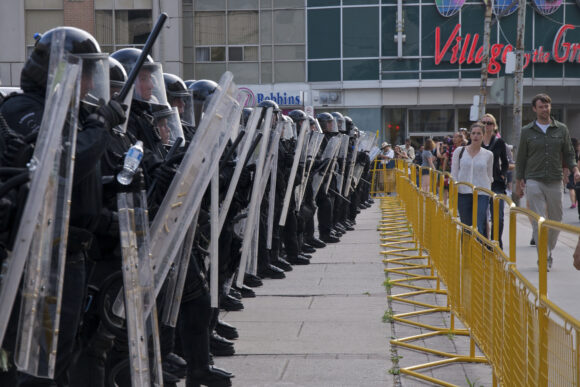Inflation, social inequality, environmental concerns, political polarization and the Russia-Ukraine war are among factors that are leading to an increase risk of civil unrest around the world, according to two reports released by industry analysts in the past month.
A report by Allianz Global Corporate & Specialty said Russia’s invasion of Ukraine dealt a blow to national economies that were just starting to recover from the COVID-19 pandemic. In the meantime, a resurgence of inflation caused economic optimism to collapse globally.
An international survey by the Edelman Trust Institute — of 32,000 residents in 28 countries — found that the percentage of respondents who felt that their families will be better off in five years time fell by 10 points since last year, to 40 percent.
Allianz said civil unrest has caused $12 billion in economic damages since 2018. Major events include riots during protests after the police murder of George Floyd in Minneapolis, protests in Peru after the ouster of President Pedro Castillo, and the “Yellow Vest” protests by blue-collar workers in France.
“Incidences of strikes, riots and civil commotion have not only increased in recent years, they are also becoming more intense and catastrophic. These types of events are making our era one of uncertainty,” stated Srdjan Todorovic, head of political violence and hostile environment solutions at AGCS. “We have seen multibillion-dollar loss events in the US, Chile, and Colombia.”
Verisk Maplecroft said in a separate report that more than half of the world saw an increase in civil unrest since the onset of the COVID-19 pandemic. Out of 198 nations, 107 saw deterioration in their civil unrest index, Verisk’s Global Risk Outlook says. Russia’s invasion of Ukraine made a bad situation worse by restricting energy supplies and further disrupting supply chains that were already disturbed by the pandemic.
Middle-income nations bear the brunt of costs from “social discontent,” the report says. Wealthier nations are able to increase spending to provide a safety net, while in low-income countries residents haven exception of government support.
Verisk said Sri Lanka and Kazakhstan experienced destabilizing unrest this year. In Sri Lanka, the cost of food and fuel spared protests. Kazakhstan sparked anger by eliminating fuel subsidies.
Verisk said crime remains a top security concern for business. Latin America is the world’s crime hotspot, with 62 out of 100 of the riskiest cities. The pandemic disrupted both legal and illicit supply chains, the report said, allowing criminal gangs to expand and diversify sources of revenue.
Crime is also a major problem for several cities in the United States. Baltimore ranked 59 on the global list of top 100 cities for crime risk; Memphis 59 and Jacksonville 70. Verisk said the United States perform far worse than their counterparts in Europe and East Asia.
Allianz’s Todorovic said the deterioration of stability is increasing interest among risk managers for specialist cover for political violence.
“The buying habits and demand remain the same for full political violence perils, but there have been significant losses in the standalone political violence and terrorism insurance market,” he said. “The impact of these losses has prompted many buyers to reconsider and reassess their limits and coverage needs as a consequence of the contraction in available reinsurance/treaty capacity.”
Was this article valuable?
Here are more articles you may enjoy.


 LA County Told to Pause $4B in Abuse Payouts as DA Probes Fraud Claims
LA County Told to Pause $4B in Abuse Payouts as DA Probes Fraud Claims  These Five Technologies Increase The Risk of Cyber Claims
These Five Technologies Increase The Risk of Cyber Claims  Tesla Sued Over Crash That Trapped, Killed Massachusetts Driver
Tesla Sued Over Crash That Trapped, Killed Massachusetts Driver  One out of 10 Cars Sold in Europe Is Now Made by a Chinese Brand
One out of 10 Cars Sold in Europe Is Now Made by a Chinese Brand 